#the harp weaver and other poems
Text

Edna St. Vincent Millay, The Harp-Weaver and Other Poems; from ‘What lips my lips have kissed, and where, and why’ (edited excerpt)
#edna st. vincent millay#the harp weaver and other poems#what lips my lips have kissed and where and why#poetry#excerpts#edited excerpts#ghost#rain#w
409 notes
·
View notes
Note
It's been raining a lot where i live and i thought about you. Could u do a post about rainy days? I would love it.

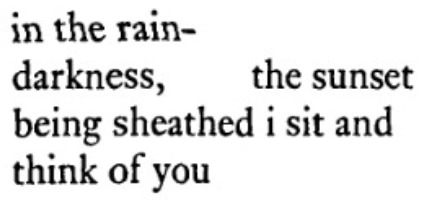
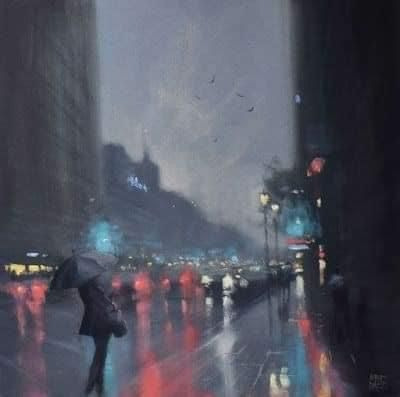



Ocean Vuong Night Sky with Exit Wounds / E.E. Cummings In the Rain; Complete Poems of E.E. Cummings: 1904-1962 / Mike Barr / Childe Hassam Rainy Midnight / Haruki Murakami South of the Border, West of the Sun / Edna St. Vincent Millay What lips my lips have kissed, and where, and why; The Harp Weaver and Other Poems
#on rain#on nature#on loneliness#ocean vuong#night sky with exit wounds#ee cummings#in the rain#mike barr#childe hassam#rainy midnight#haruki murakami#south of the border west of the sun#edna st vincent millay#what lips my lips have kissed and where and why#the harp weaver and other poems#poetry#words#writing#poem#spilled poetry#spilled ink#spilled thoughts#dark academia#dark academia poetry#dark academia quote
132 notes
·
View notes
Text
@all-you-had-to-do-was-neigh
Others parts in my 'narrative poems' tag.
The second poll is almost ready but I take suggestions for the third !
Other poems in my 'poetry' tags (Frost, Angelou, British Romanticism so far, French poetry next).
Good luck making a pick. There are quite a few of my favorites here.
Aurora Leigh
The Ballad of the Harp Weaver
The Highwayman
Metamorphoses
Goblin Market
La Belle Dame Sans Merci
Iliad
Beowulf
The Epic of Gilgamesh
#polls#narrative poems#poetry#aurora leigh#elizabeth barrett browning#the ballad of the harp weaver#edna st vincent millay#the highwayman#alfred noyes#metamorphoses#ovid#goblin market#christina rossetti#la belle dame sans merci#john keats#iliad#homer#beowulf#the epic of gilgamesh
579 notes
·
View notes
Text

“Now the autumn shudders
In the rose's root,
Far and wide the ladders
Lean among the fruit.
Now the autumn clambers
Up the trellised frame
And the rose remembers
The dust from which it came.
Brighter than the blossom
On the rose's bough
Sits the wizened orange,
Bitter berry now;
Beauty never slumbers;
All is in her name;
But the rose remembers
The dust from which it came.”
Adapted from "Autumn Chant" in The Harp Weaver and Other Poems. By Edna St. Vincent Millay
#autumn#poetry#fall season#fall colors#shabbat#blessed mabon#fall leaves#fall vibes#saturday#pumpkins#pumpkin#restoration#relaxation#self improvement#self care
22 notes
·
View notes
Text

Edna St. Vincent Millay, The Harp-Weaver and Other Poems
3 notes
·
View notes
Photo
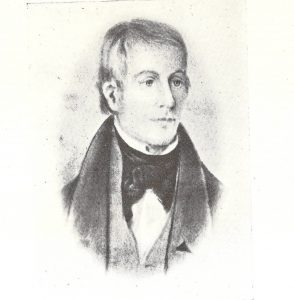


On November 4th 1774 poet and song writer Robert Allan was born in Kilbarchan, Renfrewshire.
Just as Paisley had Tannahill, Kilbarchan had its own weaver poet, Robert Allan. The son of a flax dresser, Robert Allan was born in Kilbarchan in 1774. For most of his life he lived and worked as a silk weaver in the old part of the village known as Tounfoot. In the eighteenth century Tounfoot was a thriving community occupied by weavers and other tradesmen. It had a female school, a poor house and a Baptist meeting house.
In his forties Robert Allan was an active Radical and played a significant part in political meetings and demonstrations. He presided over an important Radical meeting in the Relief Church and with other Kilbarchan weavers played a prominent part in the Radical demonstrations in Paisley in 1819 and 1820.
The two poets, Robert Tannahill and Robert Allan, were close friends and literary associates. Both were admirers of Robert Burns. Robert Allan was an active member in Kilbarchan Burns Anniversary Society, founded in 1806, and was much respected as a poet by the members of Paisley Burns Club who greatly admired his work. On 5th February, 1818, they elected him as an honorary member of Paisley Burns Club in appreciation of the quality of poems he had sent to them.
Although Robert Allan had been writing poems since the early eighteen hundreds, none of his poems had been published. In 1819, the year after he received his honorary membership of Paisley Burns Club, several of Robert Allan’s songs were published in the Harp of Renfrewshire and received special mention by the book’s editor, William Motherwell.
In 1836 Robert published a book of his own poems entitled Evening Hours: Poems and Songs. As was common at the time, the book was published by subscription. Despite his previous acclaim as a poet and the support of the subscribers, the book was not so well received as he had hoped and was not a financial success. He was disappointed and felt his merit as a poet had not been recognised. He is said to have become ‘irritable in his temper and gloomy in appearance’. According to David Semple his disappointment influenced his later decision to leave Scotland and emigrate to America.
Two other factors however may have influenced this decision. In the 1830s Robert Allan was engaged as an agent for a weaving manufacturer. From around 1840 the weaving manufacturers in Paisley, on whom the skilled Kilbarchan weavers depended for work, were entering a period of financial difficulties. The poor state of trade may have influenced his decision to emigrate.
Also in the past, some of Robert Allan’s friends had emigrated to America where they prospered. It is likely that James Scouler was one of these old friends. James Scouler, a calico printer at Locher, had fled to America after involvement in a secret Radical meeting which he attended in Kilbarchan in 1816. He subsequently established a large, successful printworks at Arlington in West Cambridge, Massachusetts, and was a wealthy man. In 1838 he left his business in the capable hands of his sons and made a return visit to Scotland where Robert Allan may well have met him in Kilbarchan.
Whatever the reason for his decision, Robert Allan, then in his mid-sixties, emigrated to America with his son Robert in 1841, but six days after his arrival in America he unfortunately died of a chill caught at sea.
At the bottom of Church Street near the spot where his house once stood, a commemorative well was erected to his memory by Kilbarchan General Society in 1935. He is the only Kilbarchan weaver to have a commemorative monument in the village.
4 notes
·
View notes
Text
White Heather & Thyme
When I pitched my idea to my teacher for my open-ended Creative Writing final project, I wanted to record a raucous blues rock song. I sat in a library, pulled out a notebook, and with the tune droning in my head I started to write the lyrics.
I usually start drafting lyrics by writing anything that comes to mind as long as it rhymes.
I'm carrying my burdens in a black leather bag
The hand of God has poked my eye for a sick immortal gag
The crows are poking the sand and chipping at my feet
Lord, I would do anything to get off this dirty street
With wordplay in mind, this was later revised as:
I've been bearing my burdens in a black leather bag
Achaean Achilles, down on her knees, dressed in Danaän drag
My skirt is but a curtain and my skin is starting to sag
The hand of God has poked me twice for some sickening gag
None of these lines would end up in the final product.
Perhaps a week later, I felt inspired by the song "Wild Mountain Thyme" and thought about adapting its melody for my project. It would be a sharp turnaround from my original plan. I had learned about the tune from the Byrds and Joan Baez. However, the tune of "Wild Mountain Thyme" is copyrighted, as opposed to other folk songs whose melodies are free to adapt anyway and anyhow.
A quick glance at the history of "Wild Mountain Thyme" shows that the song was itself adapted from a Scottish folk song called "The Braes of Balquidder." I immediately loved the version I heard by the Tannahill Weavers, and I began to play around with the tune on my guitar.
I learned to love the shimmering sound of open E tuning from Bob Dylan's outtakes of songs from his album "Blood on the Tracks." The tune of "The Braes of Balquidder" wasn't difficult to recreate on my open-tuned guitar.
One thing I changed about the tune was the addition of new chords and melody towards the end of a verse. "The Braes of Balquidder" is a little too repetitive, I thought, in its music. Other than that, the tune remained largely the same. I didn't own an E or D harmonica, so I tuned my guitar all the way down to open C, for which I did have a harp.
The drastic shift in tone from blues rock to romantic folk meant that I had to find some new and tamer lyrics. I sat in the again library and listened to a collection of crooner ballads and torch songs. I wrote the song as an extension of "The Braes of Balquidder."
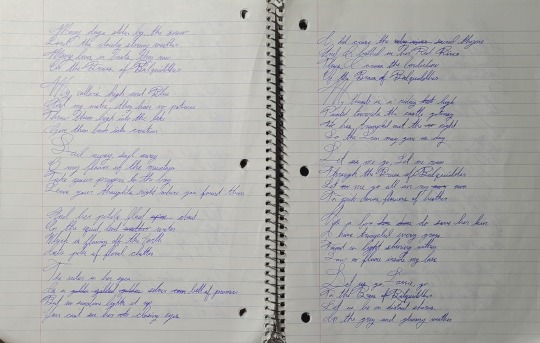
Through scrappy cursive, I wrote nearly ten pages of stream-of-conscious nonsense. I wish that I had dated these manuscripts. The ideas of "the flowers of the mountain" and "the blueberries grow 'mong the bonnie highland heather" ended up in the final draft.
I performed the song for my Creative Writing class under my flowery hat. I know that videos of this performance exist, but I don't have contact with anyone who filmed me.
The song was originally called "The Lustrous Valley" but I changed it to "White Heather & Thyme" because that would make its acronym WHAT.
Nearly a full year passed. I finally decided to publish this song with an accompanying music video.
For this video, I wanted to show handwritten lyrics overlayed on a compilation of footage I took on a wintry trip to Colorado. Somehow, I managed to lose every video I took on that trip. I have no idea how I lost it.
I was inspired by the music video for "You're Gonna Make Me Lonesome When You Go." In it, an open journal has the lyrics being written in it. I wanted to make something similar but more complex.
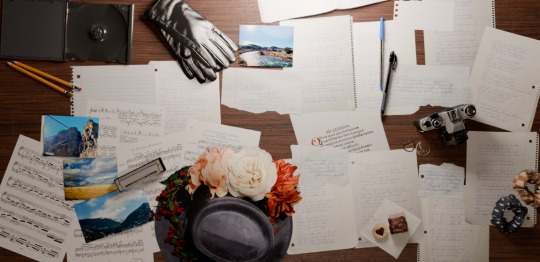
I scattered around items in Blender. They don't have any particular meaning other than a general theme of love and romance. The sheets of notebook paper are pages from my journal from when I was brainstorming the lyrics. I threw in some photos of my Colorado trip as a bonus. For specifics, I chose the poem Catullus 7 and sheet music for Les Barricades Misterieuses, Liebestraume 3, and Le Dodo ou L'amour au berceau. There is a brownie and jam cookie because we ate those on the last day of my Creative Writing class.
When it came to the write-on text, I was very particular not only about my handwriting but the words I would write. The first time, I wrote the final lyrics to the song, but on subsequent times I changed the lyrics based on the manuscripts. In the video, the lyrics reflect the first draft of the song except for this couplet:
I am armed for winter war feeling every high and low
To this terror, naught I know, but the way the breeze will blow
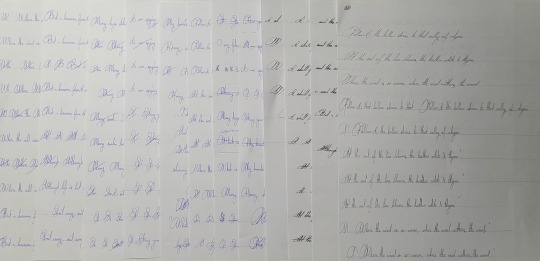
I filled the fronts and backs of pages with lazy cursive, sometimes slanted and sometimes not, sometimes fancy and sometimes simple. In the end, I opted for a slanted and loopy cursive.
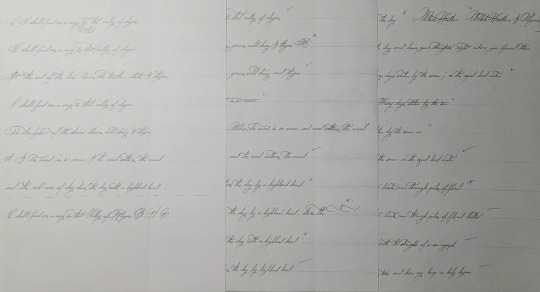
In Davinci Resolve, I traced every stroke, which was the longest and most tedious process.

I put on a couple of videos and talked to some friends, but it was still extremely boring. I would not be surprised if this part took over twenty hours in total for me to do, not just because of tracing a set of lines but tracing even more lines after I decide to redo all of the handwriting.
Afterwards, I put the text on images of torn notebook paper, then rendered it to be used in Blender.

Rendering the final animation took around five seconds per frame, and, taking into consideration some re-renders, the final render time was probably around seven hours long. As long as my sleep, anyhow, so I didn't mind.
I wouldn't say that this video was worth two weeks of inactivity on my YouTube channel, but I think it's a good excuse.
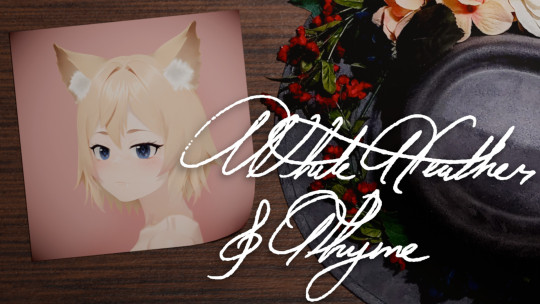
0 notes
Text

~Edna St. Vincent Millay (From "The Harp-Weaver and Other Poems")
#poems on tumblr#amreading#thesealeychallenge#sealeychallenge#poetry#poetrymonth#edna st vincent millay surprised me so well i gasped at her talent#how many voices structure this poem#the belittling gossips#the mature and troubled young woman#i love her
1 note
·
View note
Photo

Edna St. Vincent Millay, “Loving You Less Than Life, a Little Less,” The Harp-Weaver and Other Poems
0 notes
Quote
Beauty never slumbers;
All is in her name;
But the rose remembers
The dust from which it came
Edna St. Vincent Millay, from “Autumn Chant,” in The Harp-weaver and Other Poems
#edna st. vincent millay#literature#quote#autumn#fall#beauty#poem#words#the harp weaver and other poems#tbr#reading list#*
2K notes
·
View notes
Quote
but the rain
Is full of ghosts tonight,
Edna St. Vincent Millay, from What lips my lips have kissed; The Harp-Weaver & Other Poems, 1923
523 notes
·
View notes
Text
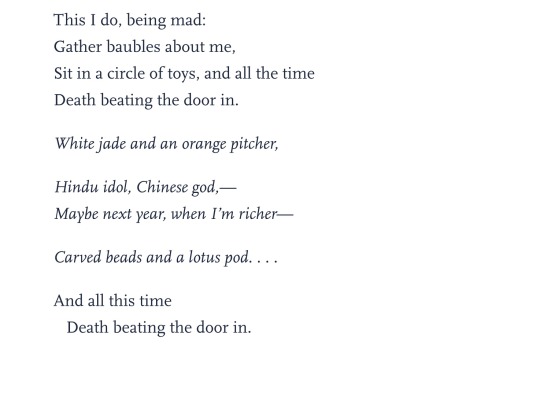
Edna St. Vincent Millay, The Harp-Weaver and Other Poems; Siege
86 notes
·
View notes
Text
Spring Song
I know why the yellow forsythia
Holds its breath and will not bloom,
And the robin thrusts his beak in his wing.
Want me to tell you? Think you can bear it?
Cover your eyes with your hand and hear it.
You know how cold the days are still?
And everybody saying how late the Spring is?
Well---cover yours eyes with your hand---the thing is,
There isn’t going to be any Spring.
No parking here! No parking here!
They said to Spring: No parking here!
Spring came on as she always does,
Laid her hand on the yellow forsythia,---
Little boys turned in their sleep and smiled,
Dreaming of marbles, dreaming of agates;
Little girls leapt from their beds to see
Spring come by with her painted wagons,
Coloured wagons creaking with wonder---
Laid her hand on the robin’s throat;
When up comes you-know-who, my dear,
You-know-who in a fine blue coat,
And says to spring: No parking here!
No parking here! No parking here!
Move on! Move on! No parking here!
Come walk with me in the city gardens.
(Better keep an eye out for you-know-who)
Did ever you see such a sickly showing?---
Middle of June, and nothing growing;
The gardeners peer and scratch their heads
And drop their sweat on tulip-beds,
But not a blade thrusts through.
Come, move on! Don't you know how to walk?
No parking here! And no back-talk!
Oh, well,---hell, it’s all for the best.
She certainly made a lot of clutter,
Dropping petals under the trees,
Taking your mind off your bread and butter.
Anyhow, it’s nothing to me.
I can remember, and so can you.
(Though we’d better watch out for you-know-who,
When we sit around remembering Spring).
We shall hardly notice in a year or two.
You can get accustomed to anything.
#edna st vincent millay#poetry#the harp weaver and other poems#spring#seasons#seasonal imagery#paralytic apathy
9 notes
·
View notes
Quote
Well I know
What is this beauty men are babbling of;
I wonder only why they prize it so.
Edna St. Vincent Millay, Sonnet III; The Harp-Weaver and Other Poems
#Edna St. Vincent Millay#poem#poetry#sonnet#poets on tumblr#pagebypagepoetry#booklr#writeblr#quote#quote of the day#the harp-weaver and other poems
3 notes
·
View notes
Quote
...but the rain
Is full of ghosts tonight, that tap and sigh
Upon the glass and listen for reply...
Edna St. Vincent Millay, The Harp-Weaver and Other Poems
1 note
·
View note
Text
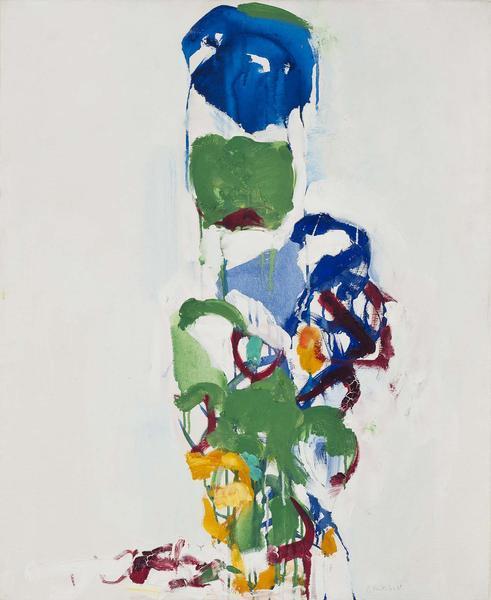
JOAN MITCHELL & EDNA ST. VINCENT MILLAY
CERCO
Esto hago, loca como estoy:
Amontonar baratijas alrededor de mí,
Sentarme en medio de un círculo de juguetes y todo el tiempo
La muerte llamando a la puerta.
Jade blanco y jarra anaranjada,
Ídolo hindú, dios chino —
Tal vez el año que viene, cuando sea más rica —
Abalorios tallados y una vaina de loto...
Y todo este tiempo
La muerte llamando a la puerta.
-Edna St. Vincent Millay, de "The Harp-Weaver and Other Poems" (1923), en "Collected Poems", Harper & Brothers, Nueva York, 1956. Versión de Jonio González
- Joan Mitchell. Untitled, ca. 1967
5 notes
·
View notes